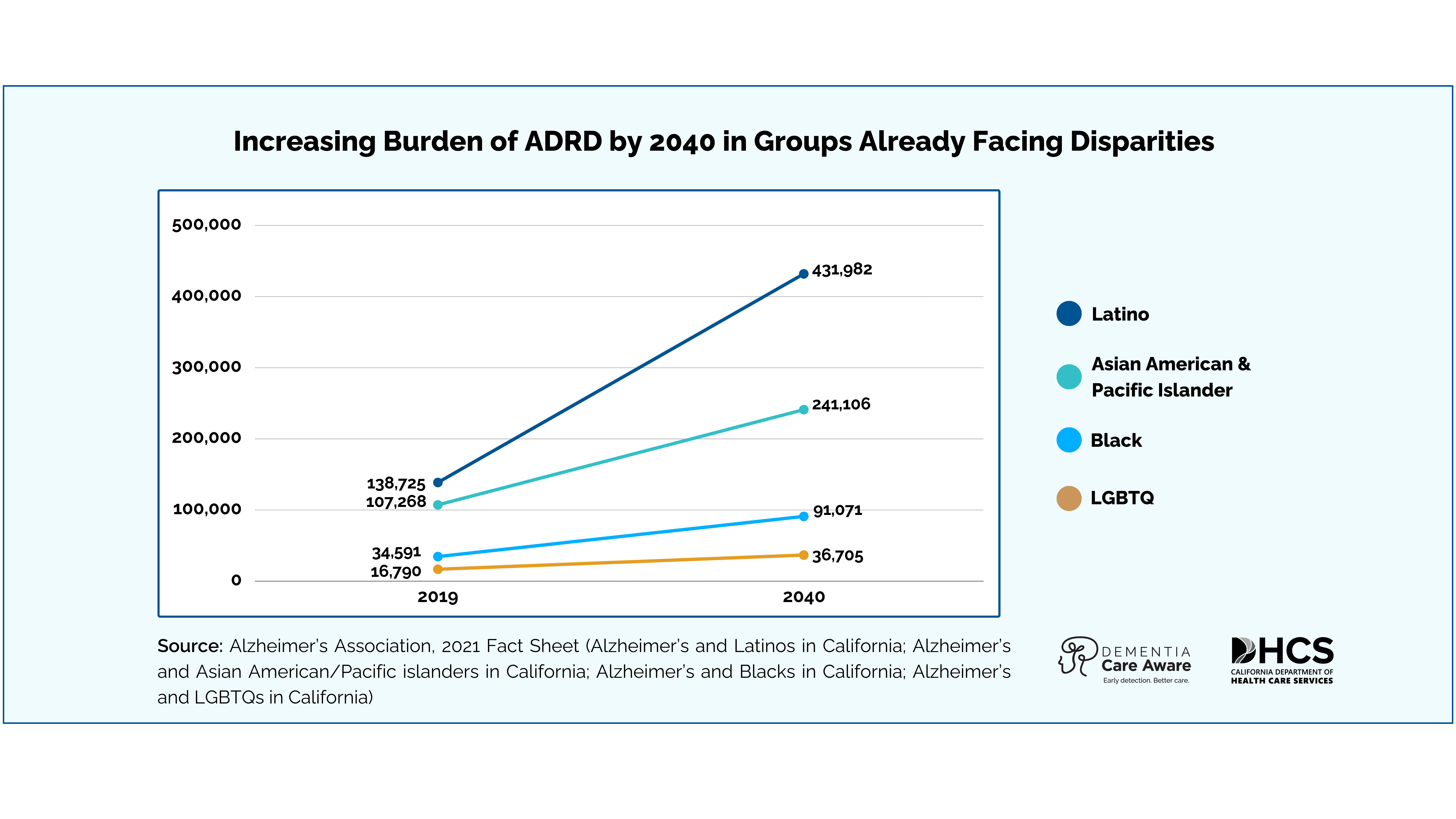Disparities in Dementia
Dementia Care Aware is at the forefront of efforts to equip providers with the tools they need to make a difference. On this page you will find links to a collection of resources to help you in caring for older adults from a variety of backgrounds. We also want to highlight what is known about disparities in dementia care and the importance of improving care for all older Californians living with cognitive impairment and dementia.

Scale and Significance of Disparities in Dementia

The prevalence of Alzheimer’s disease and related dementias (ADRD) within the US will double by 2060 [1]. In California alone, the number of individuals living with ADRD will double by 2040.
Early detection and diagnosis of cognitive impairment and dementia is crucial as we know that those with mild cognitive impairment (MCI) and early dementia benefit the most from care and treatments when they are started earlier in the disease course. Early, accurate diagnosis is associated with better outcomes overall and increases the chances that their health care providers can determine the underlying cause, for example Alzheimer’s disease, cerebrovascular disease or another cause. And determining the cause will allow people to access disease-specific treatment as well as get started on global interventions, such as hearing correction and physical activity, that help all people living with dementia.
Unfortunately, disparities in the diagnosis and management of mild cognitive impairment (MCI) and dementia are well documented in California. Research shows that Californians who identify as Asian, Black, or Hispanic, for example, are less likely to receive a timely diagnosis of cognitive impairment compared with White Californians [2].
The citations given show that In California racial and minority groups with ADRD are set to double or triple in the next 20 years. (See figure below.)
Disparities also significantly impact Californians who are socioeconomically disadvantaged and reside in rural areas. These individuals face challenges in accessing diagnostic services, obtaining early and accurate diagnoses, and receiving comprehensive dementia care services.
 These disparities are rooted in modifiable environmental, sociocultural, and behavioral factors, as well as key medical risk factors, which aggregate over generations to produce population-level differences.
These disparities are rooted in modifiable environmental, sociocultural, and behavioral factors, as well as key medical risk factors, which aggregate over generations to produce population-level differences.
Within California, socioeconomic factors are especially important, as greater neighborhood disadvantage is independently associated with later diagnosis of cognitive impairment among older adult Medicare recipients.
Health systems and providers throughout our state must take action to improve the detection, diagnosis, and management of older adults with cognitive impairment, especially those from vulnerable backgrounds, by understanding and addressing region-specific factors driving these disparities.
You Can Learn More Here! Check out our upcoming webinars. FREE CE/CME
60-minute presentations on a variety of topics to assist with dementia care from screening to care planning and implementing dementia care processes. See below for the registration details and to learn more about diversity in dementia.
- New Disease Modifying Drugs for Alzheimer’s Disease: Will We Worsen Disparities in Care?
- Dementia and Latinx population
- Dementia and AAPI
- Dementia and Black/African American population
- Dementia and Filipino Americans
- Disparities in Alzheimer’s Disease in Diverse Groups and Implications for Treatment
- Dementia and Latinx population
- Dementia and Black/African American population
Access resources specific to populations of focus on our website by searching key terms such as:
- Black / African American
- Asian American and Pacific Islander
- Latinx / Hispanic
- Spanish
Additional Resources:
- 2023 Alzheimer’s Disease Facts and Figures: https://www.alz.org/media/Documents/alzheimers-facts-and-figures.pdf
- 2023 Alzheimer’s Disease Facts and Figures- Special Report on the Patient Journey in an Era of New Treatment: https://www.alz.org/media/Documents/alzheimers-facts-and-figures-special-report.pdf
- 2021 Alzheimer’s Disease Facts and Figures – Special Report Race, Ethnicity and Alzheimer’s in America: https://www.alz.org/media/Documents/alzheimers-facts-and-figures-special-report-2021.pdf
- 2023 Diversity, Equity, and Inclusion Report: https://www.alz.org/media/Documents/DEI-report-2023.pdf
- Alzheimer’s fact sheets:

